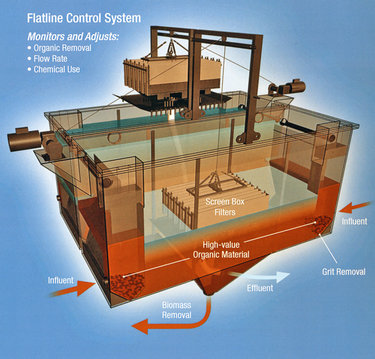$600K pilot looks to get more energy from wastewater
The Enterprise — Michael Koff
Efficient and productive: Congressman Paul Tonko, receiving a tour and demonstration Wednesday of a wastewater treatment unit at the plant on Nott Road, said “We have to invest in America’s tomorrow.” The new unit and its technology, created by ClearCove Systems, promises to decrease the cost of treating wastewater by making the process more efficient, and to use the leftover waste to create renewable energy.
The Enterprise — Michael Koff
New wastewater technology: Congressman Paul Tonko, right, listens as Gary Miller, left, president of ClearCove Systems, and Greg Westbrook, chief executive officer of the same company, discuss the benefits of their new Enhanced Primary Treatment unit installed experimentally at the wastewater treatment plant on Nott Road, in Guilderland.
— Rendering from ClearCove Systems
Enhanced Primary Treatment unit: The wastewater treatment unit, which Congressman Paul Tonko examined on Wednesday, uses a flatline control system to monitor and adjust flow rate, organic matter removal, and chemical use, resulting in a more efficient process that generates renewable energy.
GUILDERLAND — The town wastewater treatment plant on Nott Road is the site of an experimental pilot project conducted by a renewable energy company.
Congressman Paul Tonko toured the site on Wednesday and spoke about the importance of saving energy.
Tonko, a Democrat representing the Capital Region, took particular interest in the project as a member of the House Energy and Commerce Committee’s subcommittee on Environment and the Economy.
“We are always looking for ways to save money and to go greener,” Timothy McIntyre, superintendent of water and wastewater in Guilderland, told The Enterprise, adding that the project would be of no cost to the town.
ClearCove Systems, a state-based renewable energy company, partnered with the New York State Energy Research and Development Authority — NYSERDA — to move what it calls “Enhanced Primary Treatment Technology” forward.
NYSERDA awarded ClearCove Systems $600,000 for its two pilot projects, one in Guilderland and one in Ithaca.
The pilot project in Ithaca, which ran from April to October, demonstrated that the technology could increase renewable energy generation by up to 520 percent and decrease energy consumption by 50 percent, according to a report from ClearCove.
Sean Mager, a spokesperson from Tonko’s office, said that, according to estimates from the Electric Power Research Institute, treatment plants account for 4 percent of the country’s energy consumption.
The process in treatment that uses the most energy is aeration, because, after the primary treatment process, too much organic — or solid — matter flows downstream, making the secondary treatment process less efficient.
ClearCove Systems’ goal is to remove organic matter when it first enters the system, before the secondary treatment, requiring less energy consumption for that second treatment.
Its patented technology decreases flow velocity during the primary treatment process, allowing gravity to work to let the organic matter settle to the bottom of a tank. The surface water is then screened and discharged downstream for secondary treatment. The remaining sludge is pumped to an anaerobic digester for energy production.
The reduction of solid matter in the secondary treatment process reduces the potential damage to pumps, and other equipment, decreasing maintenance and replacement costs.
The sludge that is anaerobically processed easily converts to biosolids, which reduces the amount of matter being dumped into landfills, minimizes greenhouse gas emissions, and is potentially reusable.
The organic byproduct can be converted to gas or electricity.
Removal of more solid matter during primary treatment also prevents raw organic matter from being discharged untreated into waterways in the event of a treatment plant overflow.
McIntyre said ClearCove Systems would be installing a small unit at the Nott Road treatment plant, processing only a modest amount of waste, to learn how much of a difference in efficiency it could make for a residential municipality.
“They will be taking a lot of data over the next few months,” McIntyre said.



